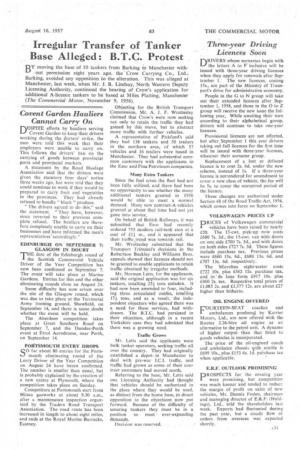Irregular Transfer, of Tanker Base Alleged: B.T.C. Protest
Page 33

If you've noticed an error in this article please click here to report it so we can fix it.
1111:ZY moving the base of 10 tankers from Barking th Manchester with out permission eight years ago, the 'Crow Carrying Co., Ltd., Barking, avoided any opposition to the alteration. This was alleged at Manchester, last week, when Mr. J. R. Lindsay, North Western Deputy Licensing Authority, continued the hearing of Crow's application for additional A-licence tankers to be based at Miles Platting, Manchester (The Commercial Motor, November 9, 1956).
Objecting for the British Transport Commission, Mr. A. J. F. Wrottesley claimed that Crow's were now seeking not only to retain the traffic they had gained by this move, but to abstract more traffic with further vehicles.
A representative of Pickford's said they had 138 tankers and 50 trailers in the northern area, of which 57 vehicles and 16 trailers were based in Manchester. They had substantial common customers with the applicants in the Esso and Fine Petroleum companies.
Many Extra Tankers
Since the fuel crisis the fleet had not been fully utilized, and there had been no opportunity to see whether the many additional tankers granted in 1956 would be able to meet a normal demand. Many new contract-A vehicles granted at about that time had not yet gone into service.
On behalf of British Railways, it was submitted that Esso had recently ordered 753 modern rail-tank cars at a cost of £11 m., and it appeared that their traffic ,trend was towards rail.
Mr. Wrottesley submitted that the Transport Tribunal's decisions in the Robertson Buckley and Williams Bros: appeals showed that licences should not be granted to enable applicants to retain traffic obtained by irregular methods.
Mr. Norman Letts, for the applicants, said the original application was foe six tankers, totalling 25i tons unladen, It had now been amended to four, including three articulated outfits, totalling 17/ tons, and as a result, the independent objectors who agreed there was a need for these services, had withdrawn. The B.T.C. had persisted in their objection, although in a recent Yorkshire case they had admitted that there was a growing need.
' Traffic Grows Mr. Letts said the applicants were bulk tanker operators, seeking traffic all over the country. They had originally established a depot in Manchester to deal with pre-war I.C.I. traffic, and traffic had grown as sonic of their contract customers had moved north.
Referring to the base, Mr. Letts said one Licensing Authority bad thought that vehicles should be authorized in the place where they would be used, as distinct from the home base, in direct opposition to the objections now put forward. Because of the difficulty of securing tankers they must be in a
position to meet ever-expanding demands.
Decision was reserved.




























































































